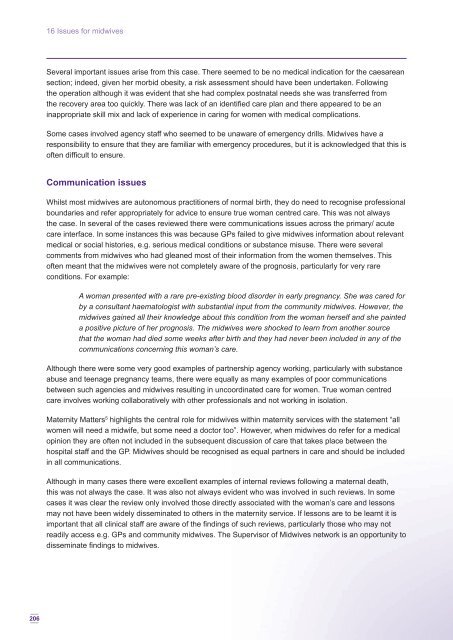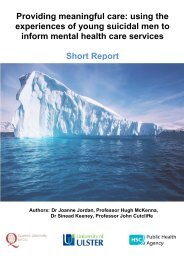Saving Mothers' Lives: - Public Health Agency for Northern Ireland
Saving Mothers' Lives: - Public Health Agency for Northern Ireland
Saving Mothers' Lives: - Public Health Agency for Northern Ireland
Create successful ePaper yourself
Turn your PDF publications into a flip-book with our unique Google optimized e-Paper software.
206<br />
16 Issues <strong>for</strong> midwives<br />
Several important issues arise from this case. There seemed to be no medical indication <strong>for</strong> the caesarean<br />
section; indeed, given her morbid obesity, a risk assessment should have been undertaken. Following<br />
the operation although it was evident that she had complex postnatal needs she was transferred from<br />
the recovery area too quickly. There was lack of an identifi ed care plan and there appeared to be an<br />
inappropriate skill mix and lack of experience in caring <strong>for</strong> women with medical complications.<br />
Some cases involved agency staff who seemed to be unaware of emergency drills. Midwives have a<br />
responsibility to ensure that they are familiar with emergency procedures, but it is acknowledged that this is<br />
often diffi cult to ensure.<br />
Communication issues<br />
Whilst most midwives are autonomous practitioners of normal birth, they do need to recognise professional<br />
boundaries and refer appropriately <strong>for</strong> advice to ensure true woman centred care. This was not always<br />
the case. In several of the cases reviewed there were communications issues across the primary/ acute<br />
care interface. In some instances this was because GPs failed to give midwives in<strong>for</strong>mation about relevant<br />
medical or social histories, e.g. serious medical conditions or substance misuse. There were several<br />
comments from midwives who had gleaned most of their in<strong>for</strong>mation from the women themselves. This<br />
often meant that the midwives were not completely aware of the prognosis, particularly <strong>for</strong> very rare<br />
conditions. For example:<br />
A woman presented with a rare pre-existing blood disorder in early pregnancy. She was cared <strong>for</strong><br />
by a consultant haematologist with substantial input from the community midwives. However, the<br />
midwives gained all their knowledge about this condition from the woman herself and she painted<br />
a positive picture of her prognosis. The midwives were shocked to learn from another source<br />
that the woman had died some weeks after birth and they had never been included in any of the<br />
communications concerning this woman’s care.<br />
Although there were some very good examples of partnership agency working, particularly with substance<br />
abuse and teenage pregnancy teams, there were equally as many examples of poor communications<br />
between such agencies and midwives resulting in uncoordinated care <strong>for</strong> women. True woman centred<br />
care involves working collaboratively with other professionals and not working in isolation.<br />
Maternity Matters 5 highlights the central role <strong>for</strong> midwives within maternity services with the statement “all<br />
women will need a midwife, but some need a doctor too”. However, when midwives do refer <strong>for</strong> a medical<br />
opinion they are often not included in the subsequent discussion of care that takes place between the<br />
hospital staff and the GP. Midwives should be recognised as equal partners in care and should be included<br />
in all communications.<br />
Although in many cases there were excellent examples of internal reviews following a maternal death,<br />
this was not always the case. It was also not always evident who was involved in such reviews. In some<br />
cases it was clear the review only involved those directly associated with the woman’s care and lessons<br />
may not have been widely disseminated to others in the maternity service. If lessons are to be learnt it is<br />
important that all clinical staff are aware of the fi ndings of such reviews, particularly those who may not<br />
readily access e.g. GPs and community midwives. The Supervisor of Midwives network is an opportunity to<br />
disseminate fi ndings to midwives.



